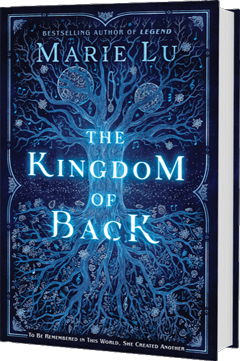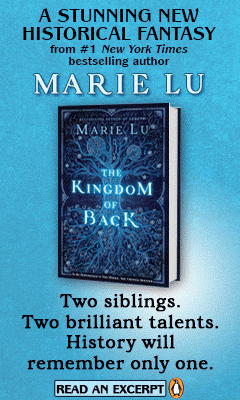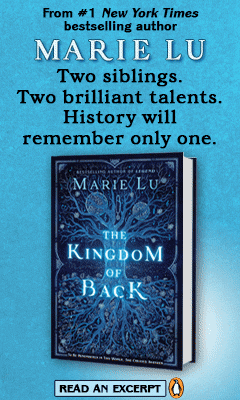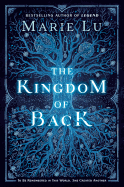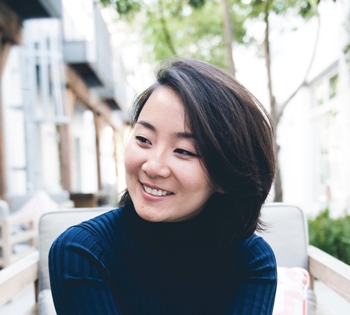The Kingdom of Back
by Marie Lu
In The Kingdom of Back, Marie Lu entwines well-researched fiction with fantasy, conjuring a captivating tale of young Wolfgang Amadeus Mozart and "the other Mozart." Historical details come alive in this fantasy-infused account of the extremely close relationship between the musical genius and his lesser-known sister, Maria Anna.
The story begins in 1759, when Maria Anna, called Nannerl by the family, is eight years old and Wolfgang only three. Their papa says Nannerl is a "miracle," and he brings Herr Schachtner, "the esteemed court trumpeter of Salzburg," home to hear her play the clavier. If she impresses, she will surely be invited to play for Herr Haydn of Austria, then on to the royal courts of Europe, thereby raising up the prospects of a family "forever on the edge of respectable." But when Wolferl innocently distracts the good Herr, Nannerl's opportunity is lost. That night, annoyed by her brother's interruption and desperate for the approval of her demanding father, Nannerl falls asleep yearning to be "worthy of praise, of being loved and remembered." For the first time, she dreams of the Kingdom of Back: a wild-looking boy walks in the surf of an ocean "lit by twin moons," and the air ripples with a "melody so perfect" Nannerl "aches to grasp it."
Time passes, and Nannerl overhears her parents speaking of a future for her defined by marriage and childbearing. She is haunted, knowing that soon, when she leaves her childhood behind, her father will stop teaching her. For now, though, Nannerl happily retreats to the haven of her clavier practice, and the menuetts she loves to play. Wolferl begs to learn the clavier, too, and Nannerl quickly understands that he has a "remarkable ear," perhaps even better than her own. After trying a few chords, her brother asks her to tell him a story, and the Kingdom of Back resurfaces. As Nannerl describes the landscape--a forest with trees that "stand upsidedown" and a shore with "sand as white as snow"--she transcribes a strange song that seems to spring note by note from this other world. Woferl plays the tune and does it so well that wonder and "a small twinge of something" (Envy? Fear?) begins to take root within Nannerl. Her old wish comes back to her: "Make them remember me."And she hears the "sweet and beautiful" voice of the wild boy: "I can help you, Nannerl, if you help me."
As Nannerl carries on with the fairy story, the siblings slowly fill in details of the fantastical kingdom. At times, it seems as if the magical place actually unfolds around them, replacing their neighborhood with the forest, and they even catch fleeting glimpses in the streets of Salzburg of the wild boy, a faery princeling named Hyacinth. Later that winter, when Woferl's musical gift becomes apparent and the family travels to Vienna for the children to play at the royal court, Hyacinth is also nearby. In return for promising to give Nannerl the recognition she craves, Hyacinth declares he needs her to help him reclaim his throne in Back. Though he warns her that "wishes have a habit of surprising their makers," Nannerl's ambition leads her to push away her unease. Fully aware that composing is "a man's realm," Nannerl cannot help writing down the "irresistibly coaxing song" Hyacinth conjures for her, thus agreeing to the bargain. Encouraged by Woferl, who promises to keep her secret, she continues to produce music originating in her visions and dreams of this other world. But her affection for Woferl is tried again and again as it becomes increasingly apparent that her younger brother will live the life she desires, even to the point of getting credit for work she herself has composed.
Nannerl Mozart was supremely talented in her own right, a young woman whose musical accomplishments were many and varied but whose dreams could only ever end in marriage. Readers are repeatedly teased by the possibilities of what might have been had Nannerl been born into another time, with far different expectations placed upon her. Lu's author's note at the conclusion points out how the fantastical Kingdom of Back was actually invented by the two siblings during their long carriage rides across Europe; their saga of music and magic is set "in a real land, full of real kings and castles and courts," but manifests also in "a dream of fog and stars, faery princelings and queens of the night." The author adds classic fairy tale elements and weaves the imaginary kingdom in and around the life of the Mozarts, increasing the tension of the story as the Kingdom of Back becomes more powerful and menacing. Torn between her deepest longing for immortality and her need to protect her beloved brother, Nannerl must decide for herself what her true legacy will be. --Lynn Becker



